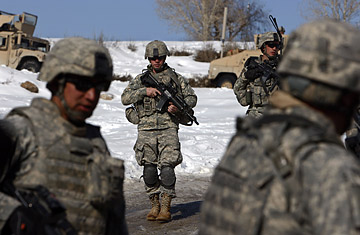
U.S. soldiers patrol the Jaji district of the southeastern Paktia province, near the Afghan-Pakistan border.
It was malice in wonderland at the Senate Foreign Relations Committee on Thursday as Bush Administration envoys insisted things are getting better in Afghanistan, while angry lawmakers from both parties cited facts and figures showing just the opposite. Even the senior Republican on the panel, Senator Richard Lugar, found the Administration's claims wanting. "I'm not sure that we have a plan for Afghanistan," he said.
Long seen as the "forgotten war" eclipsed by Iraq in U.S. priorities, Afghanistan is in the Washington spotlight this week with the release of three independent reports concluding that without a change in U.S. policy there, the erstwhile sanctuary of Osama bin Laden would remain a failed state. After spending $25 billion over six years to try to defeat the Taliban, the radical Islamist militia that had been dispersed into the mountains by the initial U.S. invasion is now a growing presence in large parts of the country. The Taliban is now setting off more bombs — including one in Kabul's fanciest hotel on January 14 that killed eight people — and fueling its insurgency with profits from the opium trade. (Last year, the country produced 93% of the world's supply.) The declining security situation saw foreign investment in Afghanistan fall by 50% last year.
The Taliban is also killing more Americans: From 2002 to 2004, an average of one U.S. soldier was killed per week in Afghanistan; by 2007, that figure had more than doubled. Indeed, nearly 500 U.S. troops have perished in America's "forgotten war." Despite the presence of 50,000 foreign troops, including 28,000 Americans, arrayed against the Taliban in Afghanistan, the Pentagon has just ordered another 3,200 Marines into the fight. And the reluctance of other NATO members to send additional troops is threatening the future of the alliance. "Make no mistake, NATO is not winning in Afghanistan," said a study by the Atlantic Council released Wednesday. "Unless this reality is understood, and action is taken promptly, the future of Afghanistan is bleak, with regional and global impact."
Despite such grim news, the message to the Foreign Relations Committee from the Administration was that things are actually getting better. "Progress is being made," said Assistant Secretary of State for South and Central Asia Richard Boucher at the hearing. "If you add together the achievements in roads, achievements in education, achievements in health care, we see a profoundly changed situation in Afghanistan." The U.S. and its allies are driving the Taliban from some of its strongholds, he added, and the bad guys are striking back the only way they can — by blowing themselves up. Across the Potomac, Defense Secretary Robert Gates said Thursday that "the rise in violence and attacks such as we saw in Kabul are the manifestation of a group that has lost in regular military terms in 2007, and is turning to terrorism as a substitute for that." And although Gates said he couldn't confirm it, a militant web site reported Thursday that Abu Laith al-Libi, a top al-Qaeda commander in Afghanistan, has been killed in Pakistan.
But at the hearing, Lugar remained unimpressed. He likened the U.S. campaign in Afghanistan to a political campaign in Indiana. A candidate can tell his supporters, "I've been to Clinton County, I've touched base, and we're doing well over here in Kokomo,'" Lugar said. "But if the final result is that you get 25% of the vote and lose three to one, this is bad news."
Retired Marine General James Jones, who once led the Afghan campaign as NATO commander and who contributed to two of the critical reports issued this week, also offered the panel a grim assessment. There is a "loss of momentum" in Afghanistan that could lead to "backsliding" if not soon regained, he said. Jones warned that the failure to curb opium production and stand up a government with functioning police and courts remain major problems. "The safe havens for the insurgents are more numerous now than they were one or two or three years ago," Jones added. "If we are correct and there's a spiraling situation in an unfavorable direction, the ultimate solution is not a military problem, but it could become one."
Democrats repeatedly cited the Iraq war as draining the resources needed to prevail in Afghanistan. Senator Joseph Biden, the panel's chairman, noted that the U.S. has spent the same amount on aid and development in Afghanistan over the past five years as the military burns through in Iraq every three weeks. "If we should be surging forces anywhere," the Delaware Democrat said, "it's in Afghanistan, not Iraq." But Boucher argued that the U.S. and its allies must be prepared to fight in multiple theaters simultaneously to prevent the emergence of terrorist safe havens that could hatch another 9/11. "You can't neglect any portion of the planet," he said.
There is, of course, a sense of dj vu here: Last year, Congress, much of the military and assorted think tankers were leery of President Bush's plans to surge 30,000 additional U.S. troops to Iraq. But he did it anyway, and it has succeeded in quelling violence across that country, at least for the time being. For now, the Bush Administration seems to be willing to bet it can repeat that performance in Afghanistan.
